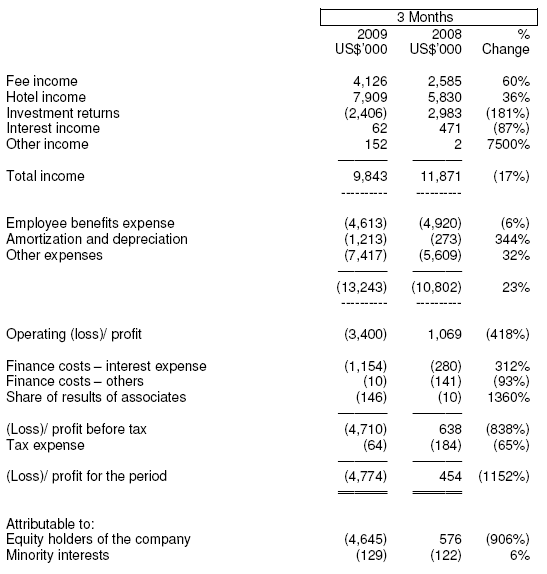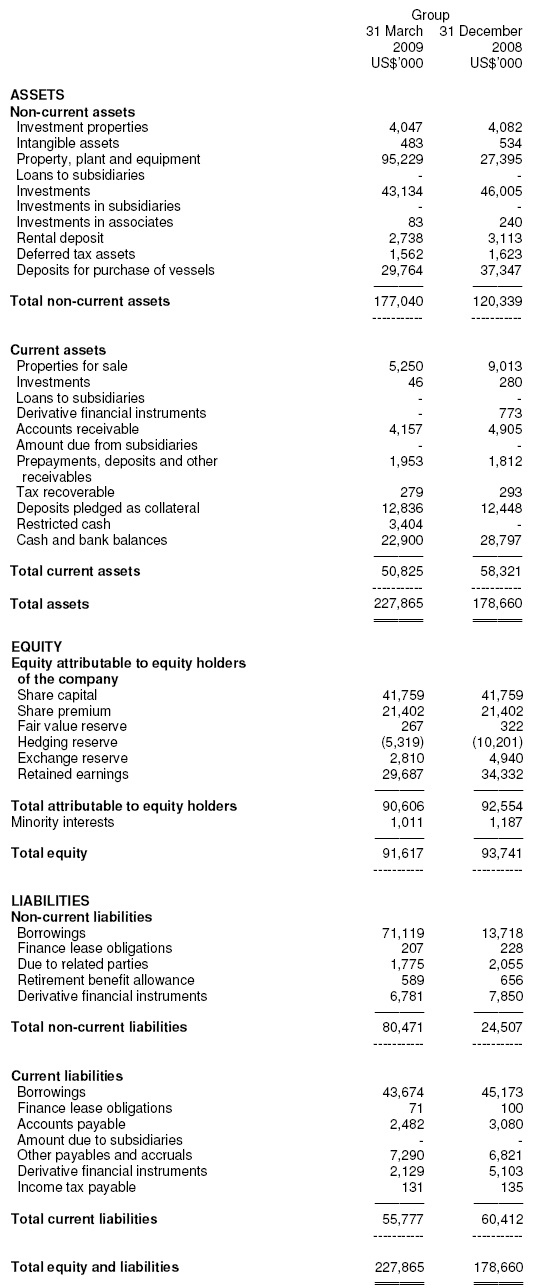投資家情報(IR)
Income Statement

Balance Sheet

Click here for the complete First Quarter 2009 Financials
Click here for the Full Year 2008 Financials
Review of Performance
Major highlights of the period
- A wholly-owned 4,300 TEU container vessel was delivered on 13 Jan 2009. Given the business of a ship owner and operator is capital intensive and debt heavy in nature, the impact was reflected in the Group's consolidated financials from 1Q09. Also, the container vessel was financed partly by Yen borrowings and any subsequent exchange gain or loss from the vessel owning subsidiary will be reflected directly on the Group consolidated income statement.
- Due to the sluggish property and hotel market, low occupancy of the hotels and net losses from disposal of residential properties during the period, Capital Advisers registered net losses in 1Q09. Capital Advisers' total income, operating loss and net loss totalled $8.5 million, ($1.2 million) and ($1.8 million), respectively in 1Q09.
- Capital Advisers disposed of two wholly-owned residential properties during the period to cash in sale proceeds of close to $4.1 million. The Group will recognize loss on disposal of $0.9 million from the sale, with completion in Mar and Apr 2009.
- Capital Advisers has been mandated to take over the asset management and property management businesses of three properties from troubled asset management companies.
- The average occupancy of Capital Advisers' hotels was 61% in 1Q09 as compared to 70% in 1Q08 and or 71% for 2008.
Review of Income Statement
Due primarily to fair value losses from investments (shipping and Japan residential), mark to market
losses on derivative financial instrument (FX contract), the absence of investment gains arising from
disposal of investments during the period and net losses from Capital Advisers, the Group recorded
net losses in 1Q09 of ($4.8 million), against a net profit of $0.5 million in 1Q08. Total income
decreased from $11.9 million in 1Q08 to $9.8 million in 1Q09 following the drop in contribution from
investment returns during the period.
The Group's income is classified under fee income, hotel income, investment returns, interest income
and other income. Fee income increased by 60% from $2.6 million in 1Q08 to $4.1 million in 1Q09
due to the consolidation of the vessel owning subsidiary's charter income. A description of the Group fee income is summarized below:
- Arrangement and agency fee refers to income for the arrangement of syndicated loans or debt financing and for the Group's agency duty in finance arrangement transactions. Finance arrangement and agency fee dropped by 80% to $0.1 million in 1Q09 due to the slowdown in finance arrangement activities and the completion of fewer transactions compared to 1Q08.
- Brokerage commission refers to commission from brokering ship charters on behalf of shipowners and the income is recurrent for the duration of the charter period/ agreement. Brokerage commission totalled close to $0.4 million in 1Q09.
- lncentive fee is received when the assets managed by the Group are divested with a gain exceeding the hurdle rate and is calculated based on a predetermined profit sharing ratio. There was no vessel disposal during the period. Incentive fee totalled $0.02 million in 1Q09.
- Asset management and administration fee is the fee for the administration and management of funds/ investments in shipping, properties and distressed assets as well as for Capital Advisers as the asset manager of hotels and residential properties in Japan. Asset management and administration fee totalled $1.6 million in 1Q09.
- Charter income is the income received from the charterer of our vessels. A wholly-owned container vessel was delivered in Jan 2009 and the charter income of $2.1 million received during the period was consolidated on the Group financial statement.
Hotel income refers to all income related to Capital Advisers' hotel business. Capital Advisers
currently owns and/ or manages 16 limited service hotels in Japan with over 2,263 rooms. The limited
service hotels target the business or leisure segment. Hotel income totalled $7.9 million. Hotel income
would include hotel operator fee (fee as operator of the hotel) and all income received from hotels
owned and leased by the Group.
Due to negative fair value adjustment and realized losses on our investments in ships and properties
in Japan, investment returns dropped from $3.0 million in 1Q08 to ($2.4 million) in 1Q09. Investment returns recognized in 1Q09 include gain
on investment of $0.04 million from hotel and residential, net loss on forward currency contract of
$0.8 million, property rental income of $0.3 million, negative fair value adjustment on shipping
investments and performance notes of $0.3 million, negative fair value adjustment on residential and
hotel properties in Japan of $1.7 million and fair value adjustment of $0.3 million from office
investment in China. During the period, the Group entered into a derivative financial instrument (FX
contract) to hedge against the strengthening of the Yen and recognized net loss on the forward
currency contract arising from the weakened Yen during the quarter. All in all, the amount of fair value
adjustment to be recognized would be highly dependent on market conditions at the time of reporting.
Employee benefits expenses dropped by 6% following the Group's cost cutting programme. Capital
Advisers' staff cost represented over 77% of the Group's employee benefits expense. Amortization
and depreciation grew by 344% to $1.2 million due to the consolidation of a vessel owning subsidiary
in 1Q09. Depreciation expenses from the vessel owning subsidiary represented close to 77% of the Group's total depreciation charges during the period. Other expenses increased by 32% due to the
consolidation of the vessel owning subsidiary, leading to an increase in vessel operation expenses
and the expansion of Capital Advisers' hotel operation, leading to higher hotel operating expenses.
Capital Advisers' operating expenses represented close to 80% of the Group's total operating
expenses. Hotel leases, hotel sub-operator fee and hotel operating expenses represented close to
64% of the Group's other operating expenses.
Finance cost rose as a result of the consolidation of the vessel owning subsidiary in 1Q09. Share of
losses from our associated company widened from $0.01 million in 1Q08 to $0.1 million in 1Q09. In
summary, the Group's net loss totalled $ 4.8 million in 1Q09.
Commentary
The shipping and financial services sectors continued to suffer from the downturn of the global economy. The situation of tightened credit, tougher lending terms and increased cost of funding persevered through to the first quarter of the year. Under the current credit crunch environment where financing is not freely available, our income stream or fee income earned for the Group's ship finance arrangement for third parties/shipping companies, will be affected unless market conditions improved.In terms of the shipping market, the charter hire and value of product tankers has seen a sharp decline since the end of 2008. For example, the Baltic Clean Tankers Index (BCTI) dropped from 839 points before the end of 2008 to 372 points as at 31 Mar 2009. The charter hire and value of container vessels continued to be placed under pressure from the decline in freight rate resulting from the drop in cargo traffic. The Howe Robinson Containership Index (HRCI) dropped from 498 points before the end of 2008 to 379 points as at 31 Mar 2009. The container market remains under the pressures of a slowdown in trade activities and reduced demand for cargo traffic. While the charterhire of bulk carriers declined substantially in the second half of 2008, the fall has stabilized and recovered moderately this quarter. As a benchmark, the Baltic Handysize Index bottomed out on 12 Jan 2009 at 268 points and rebounded to 688 points as at 31 Mar 2009. The value of bulk carriers are still on the decline. As shipping transport is closely linked to global economic activities, the shipping market will be directly impacted by the global recession. In the event the downturn continues, the fair value of our shipping investments may be further impaired.
The Group has a wholly-owned investment in a 4,300 TEU container vessel which was delivered in Jan 2009 and financed partly by Yen borrowings. The USD-Yen forward currency contract was exercised on delivery of the vessel and any subsequent gain or loss from the yen loan will be charged directly to the income statement. Meanwhile, the Yen has weakened from 90.64 JPY/USD as at 31 Dec 2008 to 98.96 JPY/USD as at 31 Mar 2009. In view of the vessel owning subsidiary's Yen borrowings, a strong Yen would result in foreign exchange translation losses for the Group.
As a summary, the Group's investment strategy/leasing term of container vessels are generally long term in nature while the investment/leasing strategy of tankers and bulk carriers tend to be more short to medium term in nature. The Group has direct and indirect investments in 14 vessels, six of which are under construction. With the exception of two new buildings (product tanker to be delivered in 2010 and bulk carrier to be delivered in 2012), the Group has secured employment for all 12 vessels. The charter period of the 12 vessels will expire between 3Q2009 and 2018. Our current charter contracts have locked in a higher charter rate as compared to the prevailing falling rates.
The Group announced on April 28 1009 that the installment payments made by the Group to Kanasashi Heavy Industries Co., Ltd., Japan in the amount of $13.1 million (Yen 1.26 billion) was fully refunded.
The property market in Guangzhou where the Group invested has corrected and leveled off in the last quarter. The prime office project (Tianhe district) where the Group invested is fully leased out and has yet succumbed to any major market corrections. The Group's fair value adjustment on office properties in China is dependent on the outlook of the office market in the Tianhe district and the direction of the RMB.
In term of the Group's property investment/ management in Japan, the tight credit policy of financial institutions prevailed in Japan and continued to put pressures on the property market. Should the property market continue to deteriorate, the fair value of the Group's investment in Japan properties may be further impaired.
The tourism industry in Japan has been affected by the downturn of the global economy. Hotel occupancy rates have seen a sharp slide since the end of 2008, carrying through to the first two months of 2009. The Group focuses on budget and limited service hotel for domestic business travelers. Two hotels to be operated by the Group will open for business in 2009 in Kyoto and Fukuoka which would increase the number of hotels under the "Hotel Vista" brandname to fourteen.
